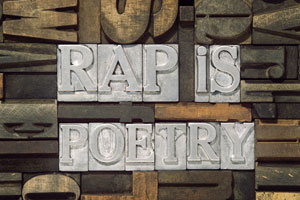Rap lyrics are often condemned as vulgar, misogynistic, and violent. In some cases, they might be, but Professor Charis Kubrin, an expert witness who studies perceptions of rap and hip hop in society, believes that rap is unfairly stereotyped as dangerous or threatening by prosecutors and other government officials who use rap lyrics as evidence against their creators.
Professor Kubrin argues that rap, like other music, is a form of artistic expression. Unlike other art forms, however, society is less likely to grant rap artists a poetic license to express themselves in figurative terms. Rap lyrics are taken literally and rappers are judged accordingly. Professor Kubrin contends that courts do not treat any other form of artistic expression in the same way.
Rap On Trial
In her research, Prof. Kubrin has identified a disturbing trend to introduce rap music lyrics as evidence of a defendant’s guilt. As an example, she cites the prosecution of Torrence Hatch (“Lil Boosie”) for first-degree murder. Prosecutors had no physical evidence to support their claim that Hatch hired a friend to kill a Louisiana resident. Their case was based on a statement that the friend recanted at Hatch’s trial. To support their shaky charge, prosecutors introduced lyrics from a number of Hatch’s songs, including “187,” which referred to people “who tried to play me … they dead now.”
The prosecutor’s tactics were justly criticized as putting rap on trial rather than Hatch. The jury apparently agreed. It acquitted Hatch after just an hour of deliberations.
Other high-profile rappers, including Snoop Dogg, have had their rap lyrics used against them in criminal trials. Snoop Dog was acquitted, but lyrics appear to have influenced juries in several cases involving amateur rappers. Prosecutors encourage juries to view rap lyrics as a confession when, in fact, they may be an artistic commentary on violence in society.
The Role Of Rap Experts
Expert witnesses are common in intellectual property cases affecting the music industry, particularly those that address sampling. Expert testimony is playing an increasing role, however, in other cases involving the use of rap lyrics as substantive evidence.
Professor Kubrin first testified as an expert in a case involving an aspiring rapper who was charged with attempting to make terrorist threats. The prosecution was based on a piece of paper found in a car that appeared to solicit PayPal donations in order to avoid “a murderous rampage similar to the Virginia Tech shooting.” The document’s author denied that the words were anything other than notes for rap lyrics, an explanation supported by notes on the other side of the paper, including “let them booty cheeks hop.”
Kubrin testified that violence and misogyny translate into sales and respect in the rap business. Boastful fabrication of violent acts is therefore commonplace in the industry. Despite her efforts to convince the jury that the defendant’s words were notes for a rap song and not a terrorist threat, the defendant was convicted.
Kubrin, at least, was given the chance to testify. Judges have sometimes been reluctant to admit the testimony of expert witnesses in criminal prosecutions that are based on rap lyrics. Ronnell Wilson, an amateur rapper, was sentenced to death after a federal jury found him guilty of murdering two undercover police detectives. Prosecutors introduced evidence of rap lyrics scrawled on a sheet of paper in which Wilson referred to leaving “.45 slugs in da back of yo head.”
Wilson’s defense attorney wanted to call an expert to testify that rap lyrics often describe violent and antisocial acts, that those lyrics are typically based on imagination and fantasy without being rooted in actual events, and that the imagery in Wilson’s lyrics was commonplace in rap music. The trial judge ruled that the expert testimony was inadmissible because Wilson’s untimely notice of the expert testimony failed to describe “the bases and reasons for those opinions,” as required by Rule 16 of the Federal Rules of Evidence. The court also suggested that the testimony would not have assisted the jury, which (according to the judge) did not need expert testimony to understand that not all rap lyrics are based on actual events.
Rap And Free Speech
Professor Kubrin has also used her credentials as an expert to help lawyers prepare amicus (friend of the court) briefs in civil cases. For example, when a student was suspended from high school in Mississippi for writing “a profanity-filled rap that decried two coaches accused of sexual misconduct,” Prof. Kubrin’s expertise assisted lawyers who are asking the Supreme Court to rule that the school district violated the student’s right to free expression. The amicus brief was founded on Prof. Kubrin’s argument that the school district “punished a young man for his art — and, more disturbing, for the musical genre by which he chose to express himself.”
As Prof. Kubrin points out, Johnny Cash didn’t shoot a man in Reno just to watch him die, and Bob Marley didn’t actually shoot the sheriff. Artistic license to refer to fictional violence in country music, reggae, or rock does not seem to extend to rap music. To address that double standard, expert witnesses are increasingly being called upon to educate juries and courts about the stereotypes associated with rap music and the social concerns that motivate artistic expression by rap artists.




